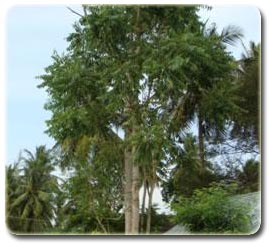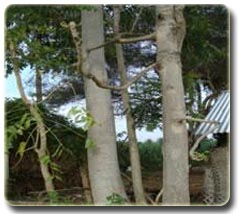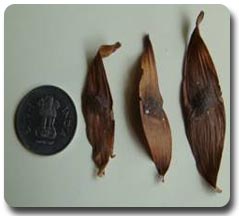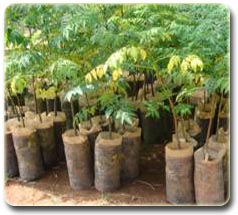
|
|||||
| Home | About Forestry | Eco-Tourism | Forestry Addresses | FAQs | Contact Us | |
|||||
| Industrial Forestry | |||||
MATCH WOOD SPECIES PEEMARAM
Scientific name: Ailanthus excelsa Distribution: Indigenous to India and more common in Bihar; Gujarat, Madhya Pradesh, Soil: Grows in all types of soils, but more suitable to red soil. Flowering: February-March Fruiting: April to May Optimum time of fruit collection: Third week of April to first week of May, when the fruits turn to brown/biscuit colour, before being blown off by wind from the mother tree. Nursery: Use of presprouted seeds obtained by soaking seeds for 24 hours followed by sprouting in wet gunny bags for 48 hours is advocated for raising nursery seedlings in polythene containers filled with soil mixture. Some of the seed sprouted only in polythene bag size 10 x 20 cm. 200 guage filled with nursery mixture of 1:1:1 red soil, sand and farmyard manure and Rose cane watering is advocated; shifting the containers to prevent rooting in the earth once in 15 days is necessary.
Planting: Size of the pit 30 x 30 x 30 cm. planting should be done during rainy season and saucer basin should be done to conserve moisture. Spacing: 5 x 5 m i.e. 160 seedlings/acre under agro-forestry situations, under rainfed conditions. Intercrops like cumbu, sorghum, blackgram, greengram and gingelly can be cultivated. If it is for a grove, the spacing should be 3 x 3 m. i.e. 444 seedlings/acre. Yield: It depends on site quality; a ten year old tree yields 150-200 kg wood. On an average, 20 - 30 tons of wood/acre is expected. The current price is about Rs.1, 000/ton. The price varies due to the production cost and availability of raw material. Plant protection measures: Eligma narcissus, defoliator and Atteva fabriciella are important pests. a) Eligma narcissus can be controlled by spraying Neem oil 2% (20 ml per litre) mixed with teepol should be sprayed to control the pest. Uses: Wood is the main raw material for matchwood industry and also used in plywood industry. |
|||||
| Home | About Forestry | Eco-Tourism | Forestry Addresses | FAQs | Contact Us | |
|||||
| © All Rights Reserved. TNAU 2008 - 2023. |
|||||



